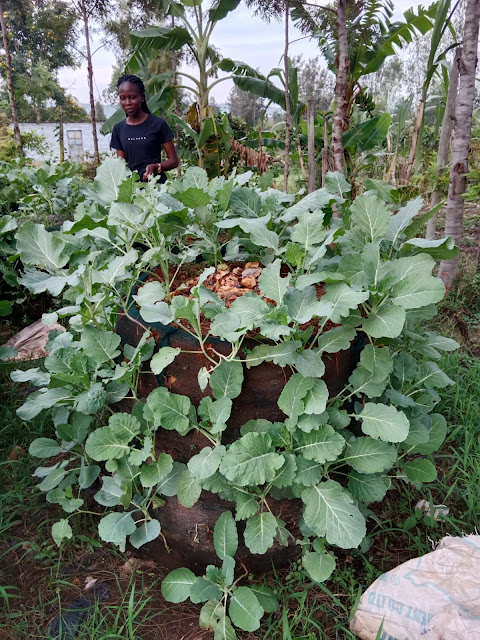Women Business Hub is a gender responsive CBO with a Mission to empower women and girls through inclusive entrepreneurship, advocacy, and capacity-building programs that advance gender equality, promote sexual and reproductive health rights, and uphold the right to bodily autonomy. Our vision is a world where every woman and girl enjoy equal opportunity, economic empowerment, and full autonomy over their bodies, lives, and choices—free from discrimination, violence, and systemic barriers.
Tuesday, September 26, 2023
Sunday, September 17, 2023
How vertical vegetable gardening is lowering food costs while maintaining nutritional health in female-headed households
Vertical vegetable farming is a method of cultivating vegetables in vertically stacked or vertically inclined layers. It is a way that enables landless families to contribute to food security. This unique farming method has the potential to lower food prices while also maintaining nutritional health in women-headed households in a variety of ways. Its successful implementation requires access to appropriate technology, training, and an initial investment. Furthermore, supportive policies and community participation may be important to ensuring the long-term success of such programs.
Sunday, September 3, 2023
Rewriting Cultural Norms and Beliefs on Family Land Inheritance to Enable Women's Land Rights
Deeply set cultural traditions
and beliefs have long determined the inheritance of family land in many Kenyan
communities, frequently barring women from this vital part of economic and
social stability. Women Business Hub is developing a comprehensive strategy to
rewrite these norms and beliefs in order to ensure that women have equal access
to land rights, thereby promoting gender equality and sustainable development.
Traditional customs, patriarchal norms, and customary practices have
historically favored male heirs in the inheritance of family land,
perpetuating gender inequalities. Land ownership is crucial for economic security,
housing, food production, and overall well-being. Denying women these rights
hinders their empowerment and perpetuates poverty.
Women Business Hub collaborates
with landless women, youth, and nonbinary people to (1) challenge and modify
deeply ingrained cultural practices and assumptions about land inheritance. (2)
Raise community knowledge and education about the benefits of women's land
rights, stressing the positive influence on social and economic growth. And (3)
increase women's ability to demand and preserve their land rights.
Women Business Hub is continuously organizing workshops, seminars, and community dialogues to sensitize people on the importance of gender equality in land inheritance. The organization collaborate with local leaders, influencers, and cultural authorities to gain their support and endorsement for women's land rights. It works closely with government agencies and civil society organizations to implement and enforce pro-women land policies.
Rewriting cultural norms and beliefs regarding family land inheritance is a fundamental step towards achieving gender equality and sustainable development and Women Business Hub is providing a grassroots foundation for a comprehensive strategy that can be tailored to specific cultural contexts to enable women's land rights and promote a more equitable society.
Friday, September 1, 2023
How vertical farming technique is helping landless families address Food Security?
Vertical farming is a modern agricultural technique that involves growing crops in vertically stacked layers or vertically inclined surfaces. This innovative approach to farming has the potential to address food security challenges, including those faced by landless families, in several ways. Vertical farming allows for the efficient use of limited space. Landless families, who may not have access to traditional agricultural land, can set up vertical farms in small urban spaces, on rooftops, or in unused buildings. This enables them to grow more food in less space, making the most of their available resources. Vertical farms can provide a continuous supply of fresh produce throughout the year, regardless of seasonal changes or adverse weather conditions. This consistent production helps landless families ensure a stable food supply for themselves and their communities. Vertical farming typically uses hydroponic or aeroponic systems, which use significantly less water and pesticides compared to traditional farming methods. This sustainable approach minimizes the environmental footprint and conserves resources, contributing to long-term food security. Vertical farms can be established in urban areas, bringing food production closer to consumers. This reduces the need for long-distance transportation and ensures that communities have access to fresh, locally sourced produce, which can be crucial for addressing food security in densely populated urban areas. Vertical farming allows for the cultivation of a wide range of crops, including leafy greens, herbs, small fruits, and even some root vegetables. This diversity in crop production can help landless families maintain a balanced and nutritious diet, which is essential for food security. Indoor vertical farms provide precise control over environmental factors such as temperature, humidity, and light. This control minimizes the risks of crop failure due to external factors and pests, ensuring a more reliable food supply. Vertical farming can offer employment opportunities and income generation for landless families. They can sell their surplus produce to local markets or restaurants, creating a sustainable source of income and contributing to their overall food security. Vertical farming requires technical knowledge and skills, which can be acquired through training programs and workshops. Landless families can benefit from these educational opportunities, enhancing their ability to grow food efficiently and sustainably. Vertical farming can be a community-driven initiative, where multiple landless families come together to establish and maintain a shared vertical farm. This collaborative approach can enhance community resilience and food security by pooling resources and knowledge. In summary, vertical farming is a promising technique that can empower landless families to address food security challenges by maximizing space utilization, enabling year-round production, reducing environmental impact, and promoting local food production. Additionally, it offers opportunities for income generation, skill development, and community collaboration, ultimately contributing to more resilient and secure food systems. We work with Empower Girls Plus Association in Kisumu County to make Food Security a reality among indigent women and their families.
Kisumu Entrepreneurs Rising Through Trade Over Aid (TOA) Initiative
The Trade Over Aid (TOA ) Initiative challenges traditional paradigms of dependency by shifting focus from aid to trade . It empowers indiv...





























